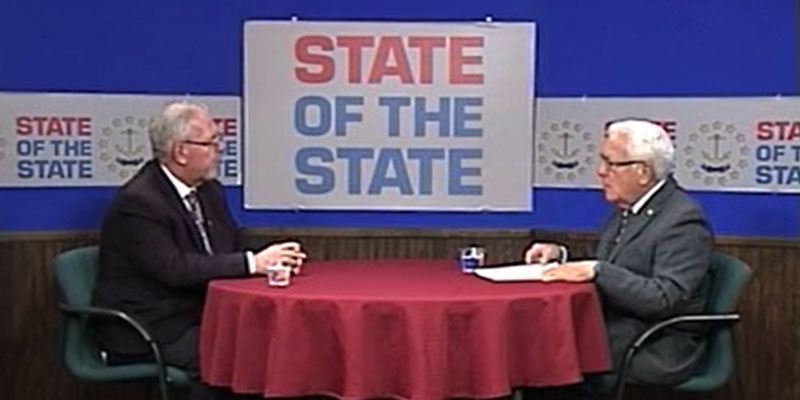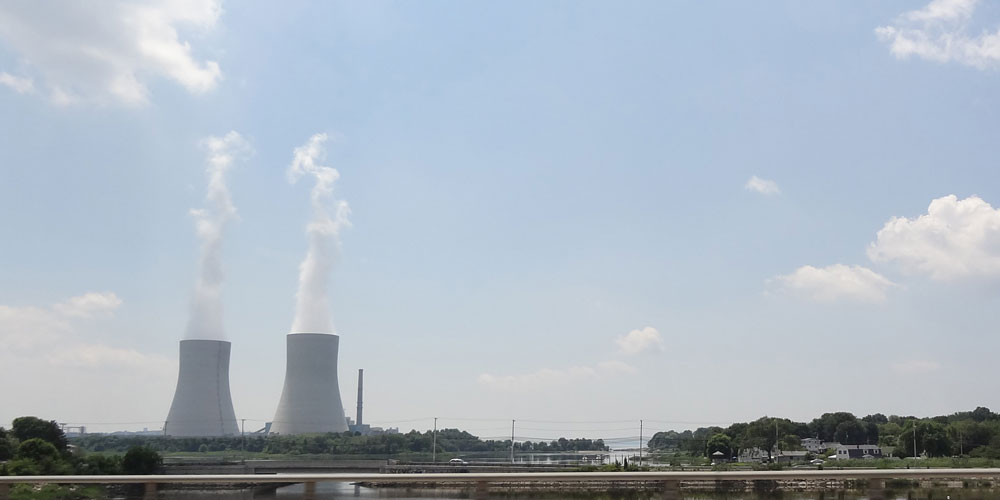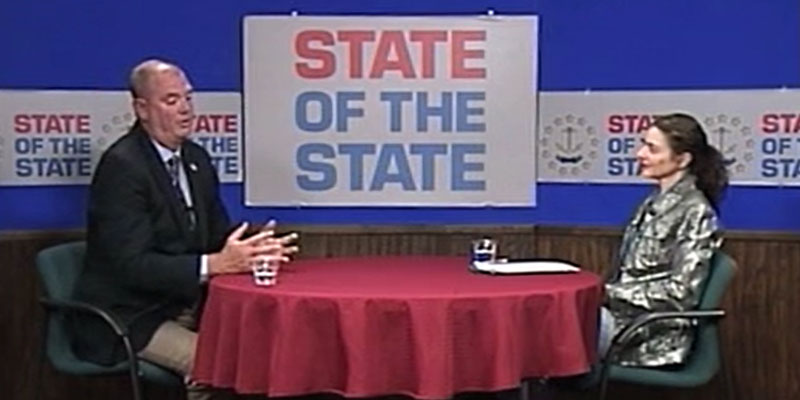Clearing out the links I’ve put aside, I came across a tweet that Bill Bartholomew sent out with a clip of himself on A Lively Experiment in early September, and he makes a point that’s still worth considering, related to stories around that time that schools were accommodating students who’d declared themselves to identify as cats:
Teen suicide rates, depression, anxiety is through the roof. If a kid wants to wear cat ears or cat whiskers, or whatever it may be, however they want to dress, y’know, let them do it, as long as it’s not distracting and disruptive to the other students in the building.
Let’s put aside all of the ideological differences — wokeness and the backlash thereto. Perhaps the most discouraging thing about public discourse in Rhode Island (and much of America) is that nobody thinks to do the most important and obvious thing, namely challenging Bartholomew’s assumptions about the effect of such accommodations on depression, anxiety, and suicide.
Perhaps there’s a debate to be had (I haven’t recently done the research to say otherwise), but it seems at least as likely to me that allowing troubled children to force others to bend to their whims and fantasies will increase their anxiety and depression. I think this for several reasons:
- Structure is a positive part of self-improvement and advancement.
- Forcing others to pretend that something is perfectly ordinary when it manifestly is not creates a condition in which the child is living within a lie, which can’t be healthy.
- Realizing that other people’s reactions are not arbitrary or pernicious, but rather constitutes fully half of every interpersonal interaction is a necessity for cultivating healthy relationships.
Yes, suicide, depression, and anxiety are high, these days, but who has been steering the culture for the past half century? Progressives, who are like those parents who cannot say “no” to their children and so turn them into neurotic messes whose core problem, I’d argue, is that they can’t get the world to respond to them no matter how much they act out.
Featured image by Thomas Le on Unsplash.
[Open full post]If you’re thigh deep in the muck of Rhode Island politics, as I am, you may find something about the local society inexplicable. The game is so locked up, in Rhode Island, that it isn’t clear whether anything can shake the stranglehold of insiders and special interests. Consider two recent stories.
On the National Education Assessment of Educational Progress (NAEP) test, Rhode Island — which, let’s remember, is near the top of the country for education spending — is about average nationally and low for New England. Democrat Governor Dan McKee appears to be hiding the state-specific proficiency scores until after the election, but we can be confident they won’t tell a better story than the NAEP.
Rhode Island spends a lot for inferior results in the area of society that many people consider to be the single most important: education of children. Why is this not a pivotal, election-changing issue? Well, McKee is now the political property of the labor unions, including the teachers’ unions, which are little more than progressive activist organizations that use labor management to raise money and secure votes, and most journalists (whether they’ll say so publicly or not) share the progressive agenda.
Still, that doesn’t excuse the rest of us. Where are you all? The lives of Rhode Island’s children are being stunted. Shame on us.
I’ve done enough independent research over the last two decades to make a relevant observation in this context: Many of the movers and shakers who might otherwise advocate for Rhode Island children long ago simply concluded that they must live in just the right districts or utilize private, including Catholic, schools, where the level of education is still good. As even the “good” public districts have deteriorated and housing costs have become such that even some elites can’t live in the right zip codes, charter schools have filled some of the gap.
In short, RI insiders are buying themselves the flexibility not to advocate for all Rhode Island children. They can ignore the bad results because it doesn’t affect their children.
The other recent story that ought to be making more waves is Rhode Island’s return to the bottom 10 of the Tax Foundation Business Tax Index. Progressives can poohpooh such metrics as free-market propaganda, but they do measure something worthy of consideration, and they do affect the impressions and decisions of people across the country.
We’re going in the wrong direction, and there will be a price to pay (even for insiders). So why doesn’t anybody seem to care?
In my decades (now) of asking variations of this question, I’ve concluded that Rhode Islanders (by which I mean you) are in one of four groups. The first includes those who are in on the take. Plenty of union members, for example, will agree with me politically, ideologically, and culturally, but their life plans are now dependent upon supporting the system as it is, and so they do.
The second includes those who have the resources to counterbalance the imposed detriment for themselves and their families. Whether they are ideologically sympathetic with the ruling progressives or remain in the state for some other reason, they can buy their way out of the ill effects of public policy. This group deserves the lion’s share of the shame.
The third group is simply ignorant. Maybe it’s a culpable ignorance, and they actively avoid learning that which should require action, or maybe it’s not, but they simply don’t know what’s going on.
The fourth group includes those who see what’s going on and would change it if they could but have concluded that it is beyond their power to affect, so they’ve made plans for exit. This group, frankly, I can’t blame.
[Open full post]On WNRI 1380 AM/95.1 FM, John DePetro and Justin Katz discuss:
- The Democrat-union “home team”
- Republicans out in the community
- Hiding the scores
- More debates
Featured image from the original cover of Charles Dickens’s A Tale of Two Cities.
[Open full post]They spent all of Republican President George W. Bush’s two terms talking about how he was “selected, not elected.” They spent all of Republican President Donald Trump’s term claiming he’d won because of Russian interference.
Now they’re claiming that if their party doesn’t win majorities during the election in a few weeks, it will be the end of democracy in America. Why? Because some Republicans have doubts about the outcome of the last election.
So, a party that has made a recurring theme of challenging the legitimacy of every Republican President this century is claiming that all elections going forward will be illegitimate because a portion of the other party is taking the view they, the Democrats, have promoted ceaselessly. Why do their voters never stop and question this stuff?
[Open full post]Guest: James Lathrop, Candidate for General Treasurer, www.lathropforri.com
Host: Richard August
Description: The discussion begins with a review of state and federal pensions and cost of living adjustments and how they are managed in the Treasurer’s Office. Lathrop suggests a more fair way of giving COLAs to those retired. Discussion includes how investment gains are applied and reported; unfunded liabilities; cost of living and cost of doing business in Rhode Island; and more. “I am really about the finances” stresses Lathrop and he asserts that his public service financial management experience suits him best for the position of General Treasures.
Heritage Action Director of Communications Noah Weinrich on parents’ role in schools, and Flibe Energy’s Kirk Sorensen on the possible role for nuclear in power supply.
Featured image by Justin Katz.
[Open full post]From time to time, I get in a little spat with some well-meaning progressive on social media that reminds me of something I figured out decades ago but periodically forget: In the belief system of many (most?) progressives, no machinery is required between intent and achievement. Wanting to help people means making it a law to provide the most-direct assistance possible. Fear of unintended consequences and suggestions that we’ll get better results with indirect assistance or cultural mechanisms cannot be intellectually honest but are mere rationalizations for hatefulness.
This approach doesn’t work. In fact, it makes things worse. To the extent progressives acknowledge consequences, they insist that they will be borne by those who are unfairly privileged and who can, therefore, afford to take the hit. This is also not what actually happens.
What sparked the above ruminations was a table in a Brookings report on the education gap between girls and boys showing Rhode Island with the seventh worst gap in the country. You can bet that if the sexes were reversed, we’d be hearing about this constantly during this election season, especially with Democrat Governor Dan McKee apparently hiding test scores until after all the votes are in.
But males are the designated privileged aggressors, so the progressive mind cannot process the gap. Boys are advantaged in our patriarchy, they may think, so it’s appropriate that girls have an edge in school. Some perhaps believe, deep down, if not consciously, that this is simply justice on behalf of all the girls in history who were not afforded education at all.
Let’s turn our attention to Rhode Island’s hidden test scores. Even if they’re no worse than they’ve been for decades, they’ll be horrible. Elementary and secondary education is among the most progressively run institutions in our country, so it is therefore failing. Rhode Island does worse, and our relatively bad results for boys are an indication of the ideology that’s causing the failure.
You can be sure, moreover, that were we to dig into the numbers, those doing the worst would be the boys who are already the most vulnerable. Again, the progressive approach doesn’t work.
Featured image by Redd on Unsplash.
[Open full post]As the election approaches, we’re moving into another crazy period during which social media becomes the equivalent of youth sports sidelines, with parents shouting out absurdly aggressive claims as if nothing their children do can be wrong while the other team’s children are apparently villainous delinquents. Here are three examples in order of the risk that they’ll get me in trouble for pointing them out.

I don’t want to pick on this particular Twitter user, but his statement is made so succinctly that it’s helpfully representative. His sentiment is simply an assertion contradictory to reality. Democrats may want it to be true, but it is precisely the sort of passive denial of facts that results in genocides. There’s a reason Biden’s people are working to ensure he doesn’t come into direct contact with Putin. He’s weak, frail, and not all there, so his handlers must ensure that nobody truly hostile can observe the makeup, choreography, scripting, handling, and coverups in person because a weak marionette in the role we used to call “the leader of the free world” would encourage escalation and violence.
People can hate Donald Trump. They can despise everything Republicans believe. But we can’t afford to be deluded about these international affairs, because doing so could get hundreds of millions of people killed. Although I’d disagree, one could reasonably say that Donald Trump’s negatives overpowered his positives, but it’s simply a fact that the world was relatively peaceful while he was president. For crying out loud, the crisis in the Middle East was approaching resolution more than at any period in my lifetime. North Korea was also the least aggressive I’ve ever seen it. I doubt it was so, but if love letters from were able to accomplish such things, I’ll volunteer to write a few. The key is that the dangerous and evil recipients must be aware that the leaders sending them will be firm and strong when it matters.
The second topic along these lines where social media rhetoric has become nuts has to do with the economy. Democrat General Treasurer Seth Magaziner has been particularly egregious in this regard (considering that he should know better as the treasurer and as somebody with an extremely expensive private school and Ivy League education), but this retweet from Democrat State Representative Michelle McGaw caught my eye:
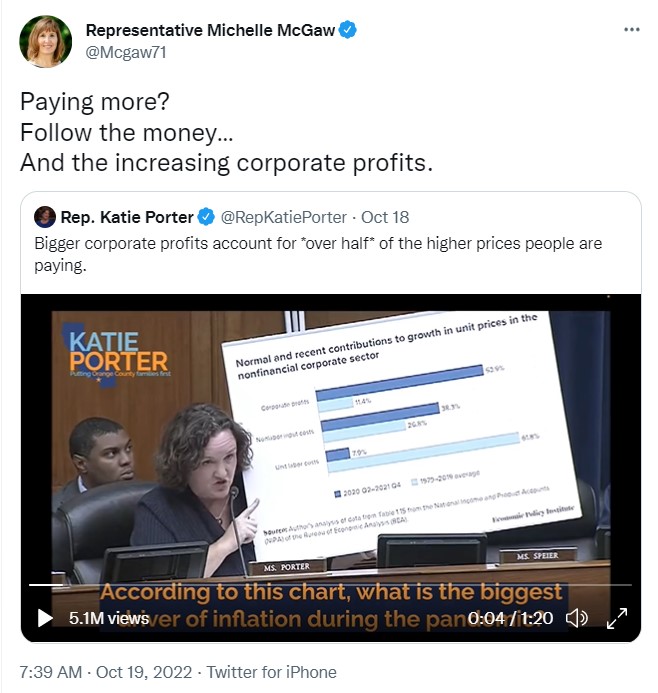
Unpacking all of the ignorance and/or deception in Porter’s video would take much more space than allotted for this post — from the questionable approach of averaging the components of price increases over half a century and comparing them with a single year to the recitation of a progressive activist think tank’s analysis as if it’s a simple presentation of facts. (We’ll never be able to have a real, objective understanding of an issue if this is how it’s done.)
The key point, though, Porter and McGaw smuggle in with the word “driver.” Corporate profits are not “driving” inflation; if corporations could do that, prices would always grow. Something else is driving the increase in prices, and for the time being that shows as “profits” to businesses, inasmuch as “profit” is simply revenue minus expenses.
This is simply how economics works. The level of demand interacts with the level of supply, compared with every other good and service on the market, to generate a price corresponding with a quantity. If demand increases or supply decreases, the price will naturally go up, which signals to everybody that there is profit to be made by shifting toward an area in which there’s a shortage. If politicians demagogue and stamp out the profits, that signal will never be sent, and the shortage will remain or worsen.
The final example of political madness I’ve seen is by far the most sensitive about which to write, but it’s important to notice and discuss. Observe the following tweet from Democrat Representative Marcia Ranglin, combined with another in which she makes clear the importance of abortion in her advocacy. Especially considering that Ranglin was not long ago caught up in a controversy for allegedly calling another black legislator a “house slave,” just a little bit of distance raises the question, “What in the world is going on here?”
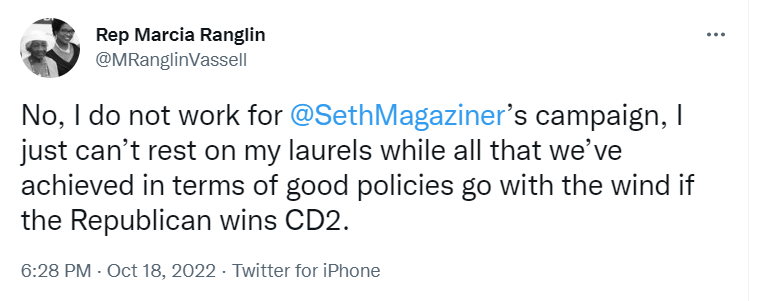
While I disagree with the progressive premise, Seth Magaziner is walking, talking evidence of white privilege, if there is such a thing, having attended an elite private school with annual tuition to rival many colleges and then Brown University, and having an estimated net worth in the millions at the young age of 39 (with eight of those years spent as a “public servant”). Yet, Ranglin insists she must actively work to further his political career in large part because he supports a practice that disproportionately kills black children by a huge margin.
How can a civilization survive when it chooses its leaders on the basis of such thinking?
Featured image by Tengyart on Unsplash.
[Open full post]On WNRI 1380 AM/95.1 FM, John DePetro and Justin Katz discuss:
- Hidden test scores
- Two governor debates
- Two polls
- Jack Reed puts a toe in the mud
Featured image by Christopher Windus on Unsplash.
[Open full post]Aaron Guckian for Lt. Governor (10/11/22) from John Carlevale on Vimeo.
Guest: Aaron Guckian , Candidate for Lt. Governor, www.guckianforltgov.com
Host: Darlene D’Arezzo
Description: Guckian asserts that qualifications matter in the Lt. Governor’s race before he begins his review of his work experience whiles explaining his view of the office and his fit and goals. Part of the job is meeting with the people and agencies the Lt. Gov. oversees. He points out that Sabina Matos has been characteristically absent from these. In response to how he compares and contrasts himself with Matos, Guckian shows his past experience and familiarity with the workings of government as a distinct advantage. A message he repeats: “Matos doesn’t show up!” “She is not here.”





